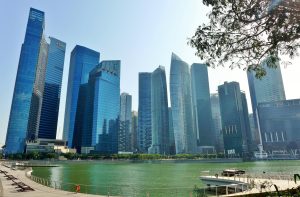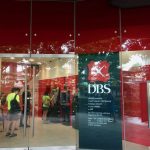As Covid-19 compels investors, investment volume will be supported by public and bite-sized deals
 Preliminary real estate investment volume in Singapore for the first quarter this year amounted to S$2.47 billion, a 36.1% drop from the previous quarter. This marks the second consecutive quarter of decline in real estate investment volume.
Preliminary real estate investment volume in Singapore for the first quarter this year amounted to S$2.47 billion, a 36.1% drop from the previous quarter. This marks the second consecutive quarter of decline in real estate investment volume.
The quarterly decline was due to the absence of significant transactions compared to last quarter and the lack of sizeable assets for sale this quarter. Nonetheless, investment sales were propped up by the luxury residential market and government land sales. There were also a fair number of related-party transactions, as well as bite-sized deals (deals below S$100 million), and this is likely to be the trend going forward.
Covid-19 compels investors and foreign capital inflows to slow to a trickle
Foreign capital inflows have slowed to a trickle, dropping by 65.1% q-o-q to S$213.99 million due to restrictions on global travel. As a result of the pandemic, investors are likely to sit by the sidelines as they wait for value to emerge.
Michael Tay, Head of Capital Markets, Singapore at CBRE, shares, “We’ve observed deals in the pipeline fall through, with bids below expectations as the buyer-seller price gap widens. The market seems to have come to a stalemate with little activity. With retail and hospitality assets in the eye of the storm, investors will be looking for distressed sale opportunities.”
Desmond Sim, Head of Research, Southeast Asia at CBRE, forecasts, “For 2020, depending on the scale and length of the pandemic, Singapore real estate investment volume should come in around 20% to 30% lower than the S$18.23 billion recorded in 2019. Investment will still be supported by ample liquidity looking for safety and value, government land sales, and unless any prominent asset comes onto the market, bite-sized deals.”
Notwithstanding the current situation, given its stability and strong fundamentals, Singapore remains a preferred investment destination as demonstrated by the results from CBRE’s recent Southeast Asia Investor Intentions Survey findings.
Highlights of Southeast Asia (SEA) investor intention survey 2020 as Covid-19 compels investors:
Table of Contents
Based on the survey findings which was intended to reveal investors’ interest in investing in SEA, asset diversification in real estate was identified as investors’ main goal, with income stability gaining importance. Lower and diminishing returns from mainstream assets, such as equities and bonds, have diverted more capital to real estate. Furthermore, real estate offers investors a more defensive income stream and provides portfolio diversification. In the search for returns, investors have shown their preference for assets to which they can value add.
Covid-19 compels investors to look hard at investment destinations
In terms of investment destination, Ho Chi Minh City (HCMC) and Singapore ranked the top two SEA cities among investors. More investors voted HCMC which is seen as having potential for greater appreciation in property values and higher yields, edging Singapore down to a close second. Investors are also more inclined towards industrial and logistics assets, which has overtaken office to become the preferred sector to invest for this year.
Looking at long term structural trends, investors looking at SEA believe that flexible space, sustainability and smart buildings (in that order) will have the greatest impact on their investments. As a result, more investors are also considering adopting Environmental, Social and Governance guidelines in their investments.
Covid-19 compels investors to temper expectations
Mr Sim concludes, “In light of the unfolding Covid-19 pandemic, investment sentiments and momentum will inevitably be dampened. However, in times of crisis, there will also present opportunities. Amid the low interest rate environment, investors will still be compelled to invest in SEA real estate assets to achieve their target returns directed by the mentioned goals and criteria.”
DBS Group Research said in March that Singapore Banks should expect slower loan growth in 1st Half of 2020. Covid-19 led slowdown to impact Singapore banks’ loan books as investors push back investment decisions.
DBS said in a note dated Feb 28 that it believes that increased uncertainty regionally and ex-Asia due to the current COVID-19 situation will result in slower loan growth in 1H20 going forward as investment decisions are pushed back. DBS has guided for a mid-single-digit loan growth, while OCBC and UOB have guided for low and low-to-mid single-digit loan growth for FY20F respectively.
 DBS sees overall loan growth for Singapore banks at c.3-4% for FY20F, remaining cognisant of downside risks should COVID-19 continue to affect more countries.
DBS sees overall loan growth for Singapore banks at c.3-4% for FY20F, remaining cognisant of downside risks should COVID-19 continue to affect more countries.
DBS expects to see some of the new bookings seen through 2H19 (relating to popular launches) being translated into mortgage drawdowns subsequently.
“We also continue to keep watch for the secondary refinancing market as y-o-y declines for secondary sales in 2H19 has moderated from declines of c. 45-50% y-o-y since the cooling measures were implemented. We believe the current COVID-19 situation may weigh on an impending property market recovery in the meantime.
We remain Neutral on Singapore banks and are cautious of the impact of COVID-19 on the domestic economy, as well as supply chains in the region. Barring any sharp deterioration in asset quality, we are of the view that share prices are likely to trade sideways; dividend yields and strong capital base should provide some support.”
Mr Paul Ho, Founder & Managing Director at iCompareLoan said, “It is already very evident that loan growth will be affected in this climate of fear caused by Covid-19. And now there is also the oil price slump. All these will affect the property sector in Singapore.”






